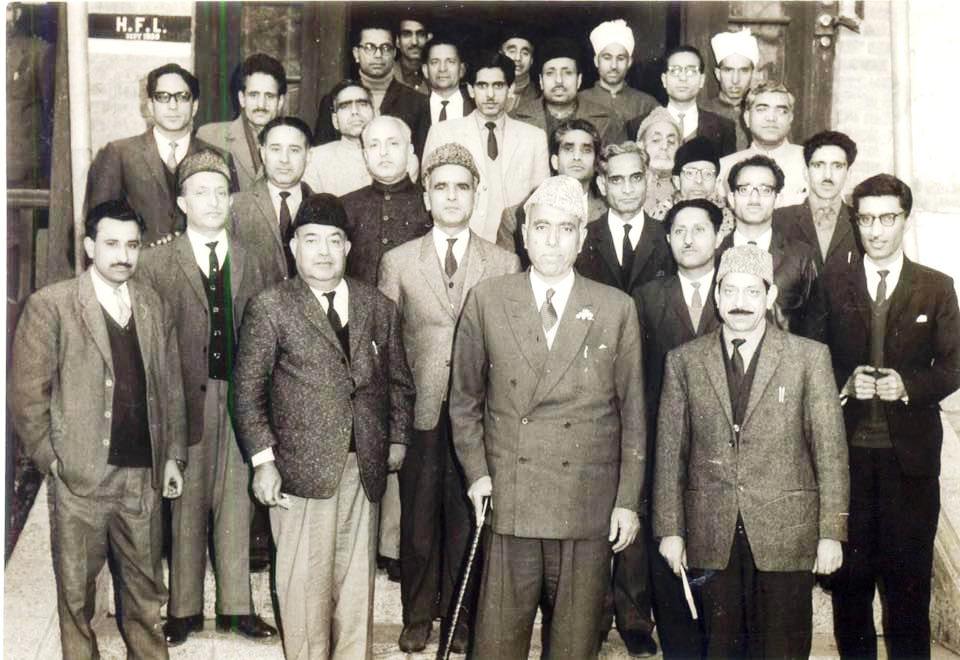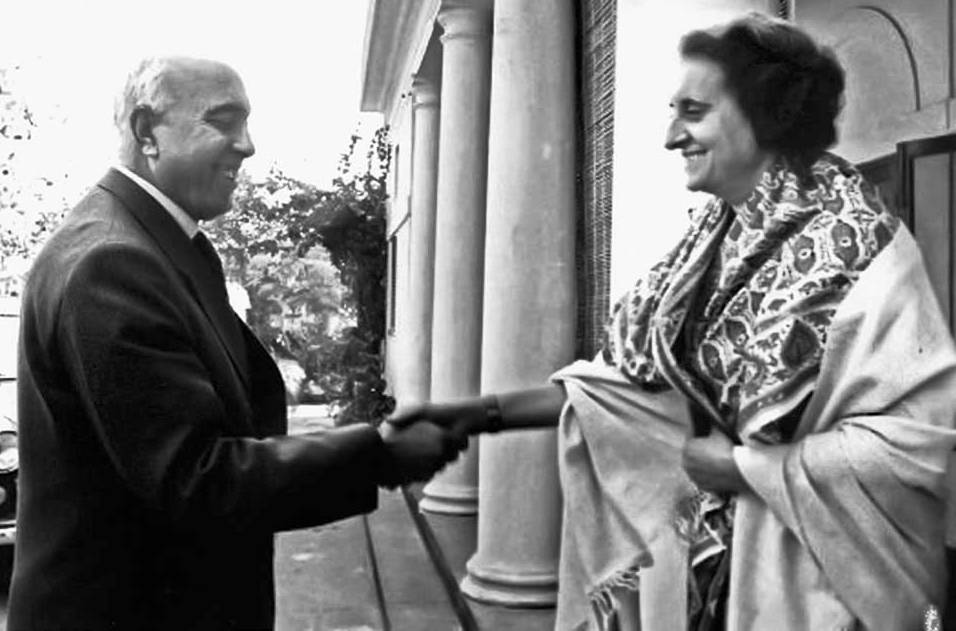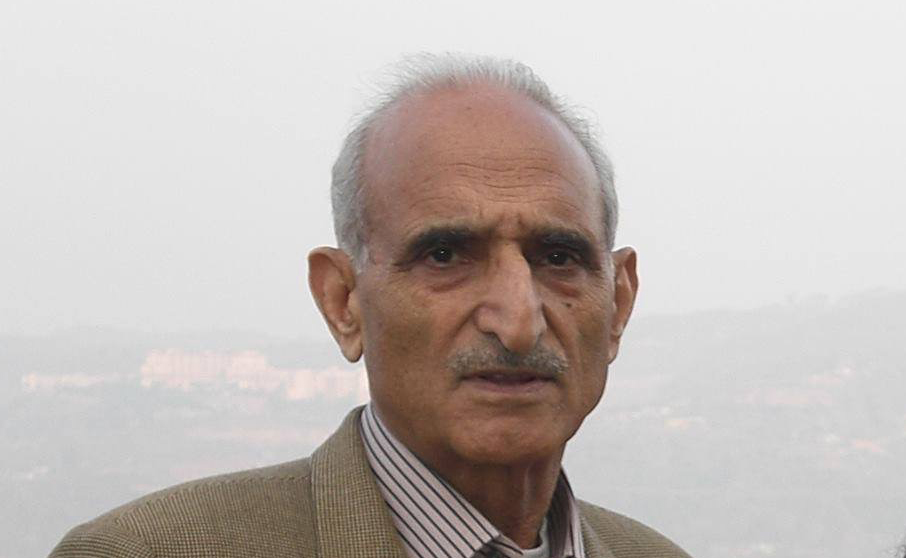by Mohammad Sayed Malik
The sole credit for giving the people of this state their first genuinely free, fair election, in 1977, goes to the then prime minister Morarji Desai who put his foot down against the move by his ministerial colleagues, Charan Singh and Jagjivan Ram to rig the polls and keep the Sheikh’s National Conference out of power.

Sheikh Mohammad Abdullah was today sworn-in as the Chief Minister of erstwhile Jammu and Kashmir state, following his sweeping victory in the 1977 assembly elections, that had many firsts to its credit.
Sheikh’s swearing-in marked the end of the first-ever governor’s rule imposed in Jammu and Kashmir on March 26, 1977, following the withdrawal of Congress support to Sheikh Abdullah-led coalition government that itself was the political by-product of the Kashmir Accord of 1975. Governor LK Jha took over the reigns of the state administration with one Advisor, KT Satarawalla. Sushital Banerji was the chief secretary. Coincidentally, I was the Director of Information and Public Relations, on contract tenure, from which I resigned soon after the election process was over.
Out of the total 76 assembly seats, the NC won 47, including 39 out of 42 seats in the Kashmir Valley, 7 out of 32 seats in Jammu and one out of the two seats in the Ladakh region. From the Valley, Abdul Ghani Lone from Langate and Abdul Rashid Kabli from Idgah managed to win their seats on the Janata Dal ticket while Syed Ali Geelani fielded by Jammat-e-Islami won his Sopore seat.
Free Polls
1977 assembly elections were universally acknowledged as the first-ever free, fair poll held in the state. The (first) elections held to the state constituent assembly in 1951, with Sheikh Abdullah as the state’s Prime Minister, were brazenly rigged with the ruling National Conference cornering all the 75 seats. There was a less-than-nominal contest in a couple of seats in Jammu.

Sheikh’s post-1953 successor, Bakhshi Ghulam Mohammad won the assembly elections in 1957 and 1962 with newer techniques of rigging. But he was ejected in 1963 via Kamaraj Plan. (Unlikely) Successor Shamsuddin’s tenure was too short-lived as he had to make way for GM Sadiq within just a few months of tentative rule. 1967 elections held under Sadiq’s command saw record-breaking ‘theft’ of opposition candidates’ oath forms leading to their summary disqualification from the contest,
1972 elections held when Syed Mir Qasim had succeeded Sadiq were preceded by outlawing the Plebiscite Front after it had declared its intention to swear allegiance to the Indian Constitution and to contest assembly polls.
Desai Plan
The sole credit for giving the people of this state their first genuinely free, fair election, in 1977, goes to the then prime minister Morarji Desai who put his foot down against the move by his ministerial colleagues, Charan Singh and Jagjivan Ram to rig the polls and keep the Sheikh’s National Conference out of power. Polling was preceded by dirty campaigning with senior leading campaigners, mainly those from the New Delhi-blessed Janata Party headed in the state by Maulana Mohammad Sayeed Masoodi, berating a bed-ridden Abdullah.
Campaigning for the NC fell on the shoulders of Mirza Afzal Beg who sought to counter the Janata Party assault with the display of ‘green handkerchief and rock salt’. To a large extent, that scenario was comparable to the recent assembly elections held in West Bengal resulting in Mamata Bannerji’s spectacular return to power.
In 1977 poll atmosphere was so surcharged that if Governor Jha, Advisor Satarawalla and chief secretary Sushital Bannerji had not acted tough to preserve administrative neutrality the NC with all its visible popular ground support could have found itself in the dumps. Credit also goes to the Chief Election Commissioner, Shyam Lal Shakder, a Kashmiri speaking renowned civil servant and former Lok Sabha secretary-general.
In political terms, July 9, 1977, was from where Sheikh Abdullah had effectively picked up the reins that were snatched from him in 1953. In effect, he had to crawl to enter and occupy the narrowed groove of constitutional authority.
A Chalk And Cheese
Nearly half a century later, though not exactly the same, but largely a similar scenario is coming up.
Post-August 5, 2019, men-are-at-work to redraw a different political landscape. Delimitation is just the tip of the iceberg floating below the surface. Sheikh Abdullah discovered the substance of the change (between 1953 and 1975) only after getting into the saddle. But by then his age was a factor in shaping his response to the emerging scenario.

Today, as still more water has flowed down the Jhelum and balance of power is virtually stuck at a point where all old calculations are rendered null and void. A new arithmetic is at work. No doubt elections are being talked about—indeed talked out—like in the 1970s and earlier. But the two situations are as different as chalk and cheese.
Today it might sound incredible but it is true: in the 1977 elections, local political sensitivities still counted with those who were running the show then. I vividly remember an instance. Governor LK Jha had prepared a draft television address to assure the people of Jammu and Kashmir that the election machinery would act fairly and that his interim administration would not take any major policy decision and would leave it to the coming legislature. Jha was a luminary. He had drafted an excellent (broadcast-cum-telecast) speech, yet he asked me to sit with him and feel free to suggest changes in the text keeping local sensitivities in mind. I was overwhelmed by this gesture and was hesitant to go for any such ‘imprudent’ exercise.
Governor’s Address
The Governor sensed my predicament and graciously asked me to carry the copy of the draft speech home and come back after suggesting changes. Somehow or the other, I mustered the strength to make certain substantial changes in the text mainly to avoid the impression that the governor was trampling on the local sentiment and that the incoming elected government might feel short-changed.

Jha not only approved the changes but thanked me for having done my duty as the governor administration’s PR chief.
After the installation of the Sheikh Abdullah-headed popular government, I put in my papers and returned to my original profession.
Looking back, things seem to have changed drastically. Old landmarks are out of sight. New ones are yet to show up. Widespread apprehension about the implications of a new order proposed to be brought into existence are thickening by the day. Ironically, supposedly main players in the field are as ignorant about it as anybody else.
(Author is a senior journalist and former editor of Business and Political Observer. This write-up was reproduced from the author’s Facebook wall.)















